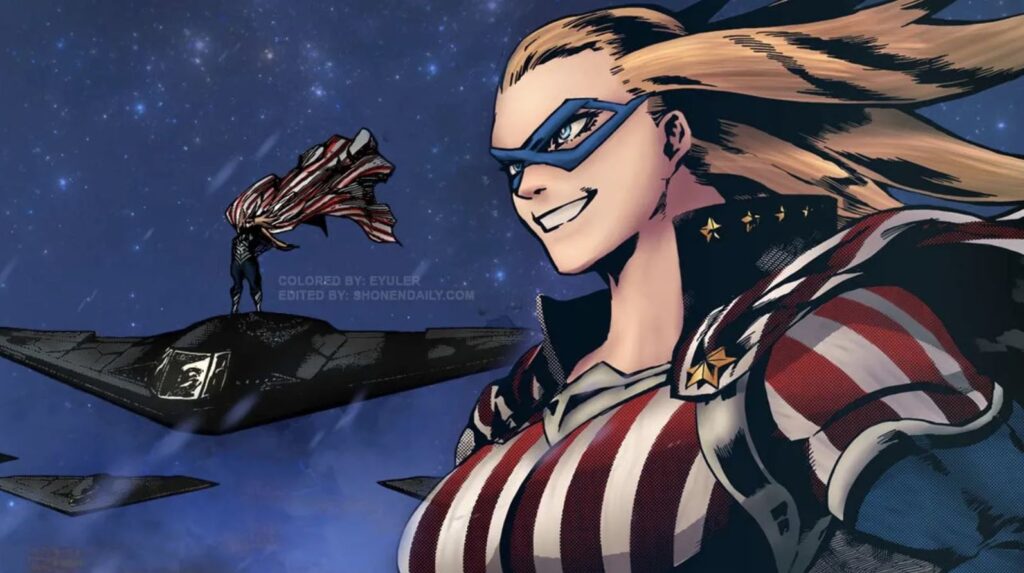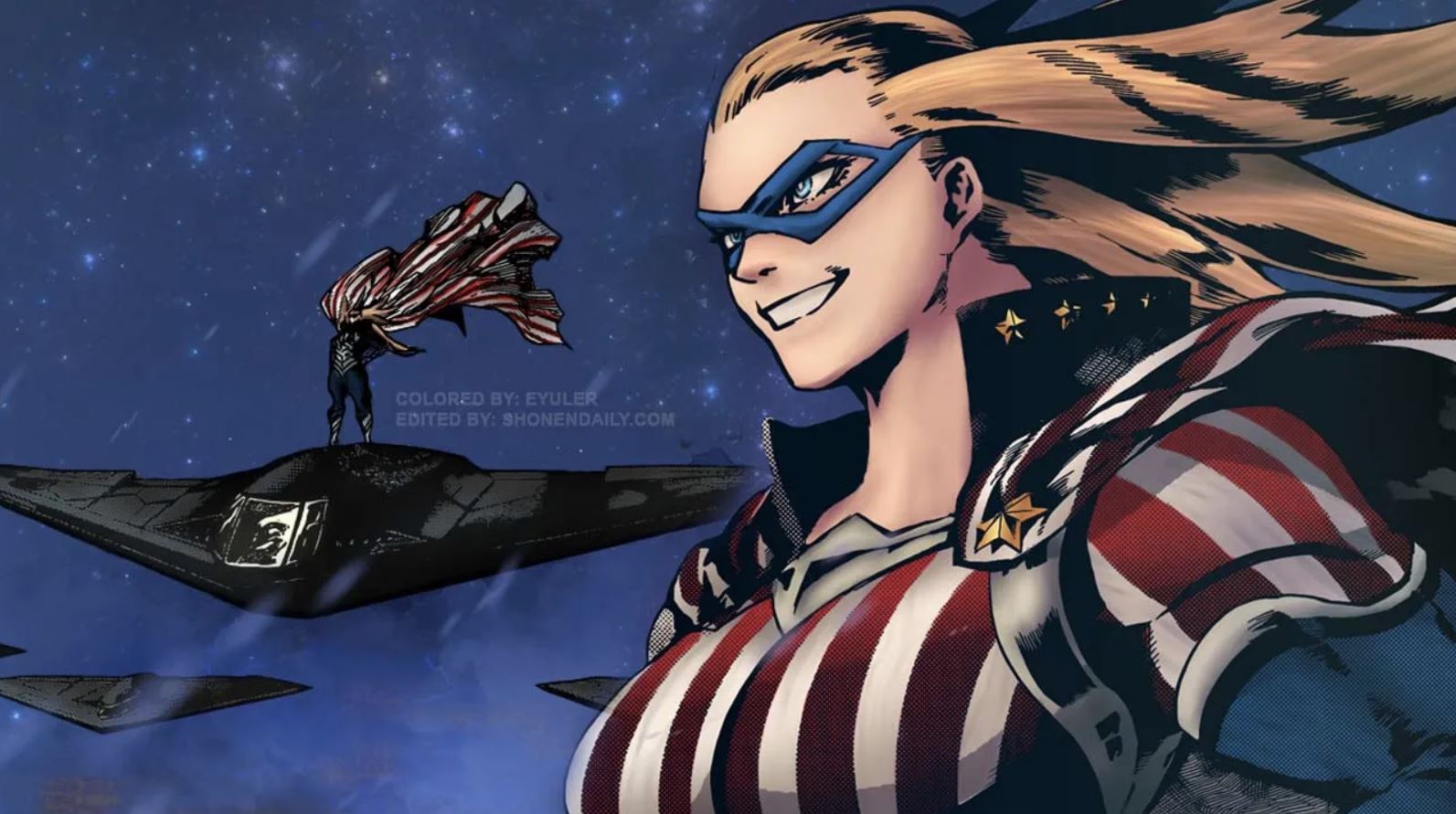
American Hero: Exploring the Concept Through My Hero Academia
The concept of the “American Hero” is deeply ingrained in popular culture, often associated with ideals of justice, freedom, and unwavering courage. While traditionally depicted in comic books and Hollywood films, the anime and manga series *My Hero Academia* offers a fresh and compelling perspective on what it means to be a hero, drawing parallels and divergences from the established American archetype. This article will delve into the portrayal of heroism within *My Hero Academia*, examining how it reflects and reinterprets the notion of the American Hero.
The American Hero Archetype: A Brief Overview
Before exploring *My Hero Academia*, it’s crucial to understand the defining characteristics of the classic American Hero. These heroes are often portrayed as individuals with extraordinary abilities or unwavering moral compasses, dedicated to protecting the innocent and upholding justice. Superman, Captain America, and Wonder Woman are prime examples, embodying values like selflessness, bravery, and a commitment to the greater good. They often operate within a clear-cut moral framework, distinguishing between right and wrong with unwavering certainty. Their heroism is often tied to national identity and the defense of American ideals. The American Hero is a symbol of hope and resilience, inspiring others to overcome adversity.
My Hero Academia: A Japanese Take on Superheroism
*My Hero Academia* presents a world where approximately 80% of the population possesses unique superpowers, known as “Quirks.” This societal shift has led to the emergence of professional heroes, individuals who use their Quirks to protect citizens from villains and maintain order. The series follows Izuku Midoriya, a Quirkless boy who dreams of becoming a hero, eventually inheriting the powerful Quirk “One For All” from the legendary hero All Might. This premise, while rooted in Japanese storytelling traditions, also resonates with the American Hero narrative.
All Might: The Symbol of Peace and an American Hero Influence
All Might, the former number one hero and mentor to Izuku, is arguably the character most heavily influenced by the American Hero archetype. His design, demeanor, and catchphrases are reminiscent of classic American superheroes like Superman. He embodies the ideals of hope, justice, and unwavering optimism. All Might’s catchphrase, “I am here!” echoes the reassurance and confidence expected from an American Hero. He strives to be a symbol of peace, inspiring hope and deterring evil through his sheer presence. His larger-than-life persona and unwavering commitment to saving lives are hallmarks of the American Hero tradition.
Similarities to the American Hero
- Unwavering Optimism: Both All Might and many American Hero figures project an unwavering sense of optimism, even in the face of overwhelming odds.
- Commitment to Justice: The pursuit of justice is a core value for both All Might and the American Hero archetype. They are dedicated to protecting the innocent and fighting against evil.
- Symbol of Hope: Both serve as symbols of hope, inspiring others to overcome adversity and strive for a better future.
Differences from the American Hero
- Cultural Context: While inspired by the American Hero, All Might operates within a Japanese cultural context, which influences his behavior and motivations.
- Vulnerability: Unlike some invulnerable American Hero figures, All Might is shown to be vulnerable, both physically and emotionally, adding a layer of complexity to his character.
- The Burden of Symbolism: The series explores the heavy burden placed on All Might as a symbol of peace, highlighting the sacrifices he makes and the toll it takes on his well-being.
Other Heroes in My Hero Academia: Diverse Interpretations of Heroism
*My Hero Academia* doesn’t limit its exploration of heroism to a single archetype. The series features a diverse cast of heroes, each with their own motivations, strengths, and weaknesses. These characters offer different interpretations of what it means to be a hero, challenging and expanding upon the traditional American Hero narrative.
Shoto Todoroki: Overcoming Trauma and Embracing Heroism
Shoto Todoroki, the son of the number two hero Endeavor, initially struggles with his Quirk and his relationship with his abusive father. His journey involves overcoming trauma and learning to embrace his full potential as a hero. He is a powerful hero, but his personal struggles make him a more relatable and complex character. His journey is less about embodying a perfect ideal and more about personal growth and redemption, a different take compared to the traditional American Hero.
Ochaco Uraraka: Heroism for Practical Reasons
Ochaco Uraraka’s motivation for becoming a hero is primarily driven by her desire to support her family financially. She wants to earn money to provide a better life for her parents, a pragmatic and relatable goal. This contrasts with the often idealized motivations of the American Hero, who are typically driven by a sense of duty or a desire to protect the world.
Tenya Iida: Heroism Rooted in Duty and Responsibility
Tenya Iida, the class representative, embodies a sense of duty and responsibility. He strives to uphold the rules and act as a moral compass for his classmates. His heroism is rooted in his strong sense of justice and his commitment to following in the footsteps of his older brother, a respected hero. This sense of duty resonates with some aspects of the American Hero, but Iida’s focus on rules and order provides a different perspective.
Villains: Exploring the Dark Side of Quirk Society
The villains in *My Hero Academia* provide a crucial counterpoint to the heroes, exploring the darker aspects of Quirk society and the potential consequences of unchecked power. Characters like Stain, the Hero Killer, question the commercialization of heroism and the motivations of many pro heroes. The League of Villains, led by Tomura Shigaraki, represents a more nihilistic and destructive force, challenging the very foundations of hero society. Understanding these opposing forces is crucial to understanding the nuanced depiction of heroism presented in the series. The presence of complex and compelling villains is also a hallmark of many American Hero narratives, providing a necessary challenge to the hero’s ideals.
The Impact of My Hero Academia on the Hero Genre
*My Hero Academia* has had a significant impact on the hero genre, both in Japan and internationally. Its popularity has demonstrated the enduring appeal of superhero narratives, while also showcasing the potential for new and innovative interpretations. The series has resonated with audiences of all ages, offering a compelling blend of action, humor, and character development. The series’ exploration of heroism, with its diverse cast of characters and nuanced perspectives, has broadened the definition of what it means to be a hero. It offers a fresh perspective on the concept of the American Hero, adapting and reinterpreting the archetype for a new generation.
Conclusion: A Global Perspective on Heroism
*My Hero Academia* offers a fascinating glimpse into how the concept of the American Hero is perceived and reinterpreted in a different cultural context. While the series draws inspiration from classic American Hero archetypes, it also introduces its own unique elements, creating a compelling and thought-provoking exploration of heroism. By examining the similarities and differences between the heroes of *My Hero Academia* and the American Hero, we gain a deeper understanding of the universal appeal of heroism and its ability to transcend cultural boundaries. The series ultimately suggests that heroism is not defined by nationality or specific abilities, but rather by the choices we make and the values we uphold. Whether inspired by the American Hero or rooted in Japanese tradition, the pursuit of justice, the protection of the innocent, and the unwavering commitment to hope remain the defining characteristics of a true hero. *My Hero Academia* provides a fresh and exciting perspective on the timeless concept of the hero, demonstrating its enduring relevance in a globalized world. [See also: The Evolution of Superheroes in Modern Media]

